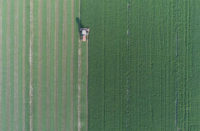To address agricultural challenges, Land O’Lakes President and CEO Beth Ford stressed the need for a comprehensive, long-term water sustainability strategy, and shared why water is at the top of her priority list, during a May 8 Heuermann Lecture at Nebraska Innovation Campus in Lincoln, Neb.
“Fresh water demand will outstrip supply by 2030 by 56% globally, and water is critical to production agriculture, it’s critical to communities and to life,” Ford said. Water issues and policies are very local but have global implications, especially with agriculture and the food supply.
To meet the grand challenge of feeding 10 billion people by 2050, more agricultural research funding is needed, said Ford. While GMOs have increased yields by 25%, Ford said we’ve nearly maximized the increase in production that they can provide. However, she said research funding is still at 1970s levels, while we simultaneously face an unprecedented challenge of population growth, climate change, water crisis, and food insecurity.
She also addressed the need for more agricultural laborers to ensure all available food is harvested and all available acres are planted.
Ford referred to Land O'Lakes extensive involvement throughout the entire production agriculture value chain. Along with its dairy production, Land O’Lakes business offerings also include animal nutrition through its Purina brand, research-based agronomic products through its Winfield United company, work with smallholder farmers through its non-governmental organization, Venture 37, and sustainable production practices through its Truterra business.
Truterra brings insights into how farmers can make their land more resilient against climate change through practice change, whether that be carbon capture, cover crops, variable rate application of fertilizer or other things, Ford said. But all that transition costs money. USDA recently awarded the company a $90 million grant to help farmers transition to more sustainable practices.
“We must and we should want the farmer to be profitable. We should want the investment for the farmer to be secure. It is in all of our best interests,” Ford said.



